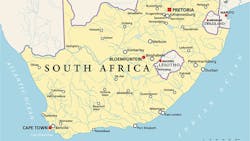Carmakers, Union Sign Wage Deal to Avert South Africa Strike
South African units of automakers including Nissan Motor Co. (IW 1000/25) and Volkswagen AG (IW 1000/8) signed a three-year wage agreement with the main industry union, marking the first time in nine years that talks have concluded without labor disruptions or work stoppages.
The deal with the National Union of Metalworkers of South Africa offers an “enhanced and competitive” wage structure and benefits for the automotive industry’s hourly paid workers, according to the Automobile Manufacturers Employers Organization, which negotiates on behalf of the carmakers. The package also includes provisions to increase access to housing for employees, it said in an e-mailed statement on Friday. The AMEO didn’t provide further details on wage increases.
“The new wage agreement gives us a platform on which we can plan further investment,” National Association of Automobile Manufacturers of South Africa President Mike Whitfield said. “It sends a clear signal to our international parent companies of our serious intent to nurture and grow the automotive manufacturing industry in South Africa,” said Whitfield, who is also chief executive officer of Nissan South Africa.
Bright Spot in Economy
South Africa’s automotive manufacturing industry, while representing less than 1% of global production, is an increasingly important contributor to the country’s exports and among few bright spots in the economy. While BMW AG, Ford Motor Co. and Volkswagen have announced 13 billion rand (US$909 million) of investment in South Africa in just over a year and a Chinese state automaker is planning an 11 billion-rand plant, executives have warned repeatedly that the industry would suffer from another extended stoppage.
A two-week strike in 2013 cost the sector at least 20 billion rand in revenue, Naamsa said at the time. The stoppage was followed by a strike in the car-parts industry the same year and workers in the metalworkers sector also downed tools in 2014, forcing some vehicle manufacturers to stop production because of component shortages.
Naamsa sees South African vehicle output at about 630,000 units this year, more than half of which will be exported, Whitfield said in a speech last week. The broader industry contributes more than 7.5% of South Africa’s gross domestic product and an estimated 3.4% of the national wage bill, Naamsa Executive Director Nico Vermeulen said in Friday’s statement.
By Liezel Hill
About the Author
Bloomberg
Licensed content from Bloomberg, copyright 2016.
